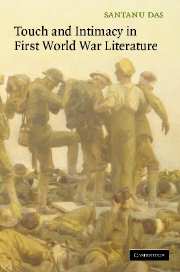3 - ‘Kiss me, Hardy’: the dying kiss in the First World War trenches
Published online by Cambridge University Press: 05 March 2014
Summary
January 12, 1916 saw a peculiar drama enacted in the trenches – two men, who had left their girlfriends back in England, were exchanging a ritual of kisses:
As we arrived at the barn-door he said, ‘Just a moment, Frank, before we go in I've something else to give you – put that light out.’ I put the lamp out and into my pocket, wondering what was coming. Then I felt an arm round my neck, and the dear lad kissed me once – ‘that's from Evelyn’ [Cocker's fianceé] he said; then he kissed me again and said, ‘that's from your Mother.’ I returned his tender salute and said, ‘that's from me.’ There we were, two men, like a couple of girls, – but then, there was no one about, and the matter was a sacred one between us, – and you.
This is Lieutenant Frank Cocker's letter to his girlfriend Evelyn, written from the trenches. The exchange of this ‘tender salute’ is a climactic episode in the charged friendship between Cocker and his ‘dear Charlie’, a relationship that can be pieced together from the letters Cocker wrote to Evelyn and to his sister, Minnie. What is striking is not so much the nascent homoeroticism but how this kiss between the two men is snugly contained within a heterosexual framework through the trope of the girlfriend and the mother. With its detailed stage management, the narrative transmits some of the excitement of the actual moment, as does Cocker's ready reciprocity with the frank acknowledgement, ‘that's from me’.
- Type
- Chapter
- Information
- Touch and Intimacy in First World War Literature , pp. 109 - 136Publisher: Cambridge University PressPrint publication year: 2006



